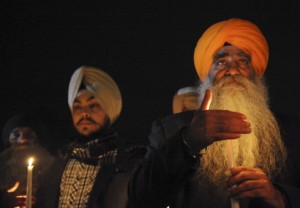
Co-blogged by American Turban and Sundari

San Quentin State Prison, California. (Image: San Quentin News.)
The Sikh Coalition, a civil rights organization, was recently asked to present to a group of inmates at San Quentin State Prison in Northern California.  Organized by the Asian Prisoner Support Committee, which has a weekly class inside San Quentin State Prison called SQ ROOTS (Restoring Our Original True Selves), the organization was asked to make a presentation about the Sikh community.  The class is modeled after Asian American Studies courses, covering topics such as history, culture, personal experiences as well as health and reentry issues.  The class is comprised of Vietnamese, Filipino, Cambodian, Hmong, Lao, Chinese, Mexican in addition to Punjabi Sikh men.
The presentation included a Sikh awareness talk followed by a discussion on the post-9/11 challenges experienced by the Sikh community, including hate crimes, school bullying, religious profiling and workplace discrimination.  It was a unique experience for both the Sikh Coalition volunteers as well as the inmates who noted at the end that they were “grateful†and “thankful†to have learned about the Sikh community and the issues that Sikh Americans were experiencing.  It was a moving experience and pushed us to think about restorative justice and the role of forgiveness within Sikhi.
Many of us on the “outside†have preconceived ideas about what life is like inside the prison system. To be sure, our few hours inside the prison and interacting with the inmates may not be a fully representative view of prison life. Yet, the warm reception we received by inmates before, during, and after our session was eye-opening; the inmates in our class were very engaged, courteous and collegial. We enjoyed the positive and warm atmosphere exuded by each member of our audience, and were touched by the obvious desire by these inmates to learn more about the Sikh community, and to even empathize with some of the issues that Sikhs in this country have faced.
A few weeks ago, the Indian Supreme Court re-criminalized sexual acts between consenting adults of the same sex. The Supreme Court  overturned a 2009 decision by the Delhi High Court to strike down section 377 of the Indian Penal Code, which came directly from a British colonial law from 1861. Section 377, which was just reinstated, states:
overturned a 2009 decision by the Delhi High Court to strike down section 377 of the Indian Penal Code, which came directly from a British colonial law from 1861. Section 377, which was just reinstated, states:
377. Unnatural offenses — Whoever voluntarily has carnal intercourse against the order of nature with any man, woman or animal, shall be punished with imprisonment for life, or with imprisonment of either description for a term which may extend to ten years, and shall also be liable to fine.
As Prerna Lal states about the recent ruling, “the Indian Supreme Court has re-criminalized gay sex in India, rendering almost 20 percent of the global LGBT population illegal.” As a result, LGBT Indians and their allies in India and around the world have taken to the streets, signed petitions, and engaged in creative actions through social media, showing their outrage about this backwards decision.
But what has the Sikh response been? I have previously written about the homophobia rampant in our community and how ironic it is, given our Gurus’ deep commitment to equality and social justice. In the days after the ruling on 377, I wondered if any Sikh activists committed to LGBT equality would come out of the woodwork. I also wondered about the Sikh response to the ruling in India and if any Sikh institutions publicly supported or lobbied for this ruling. Embarrassingly, Sikh institutions have publicly campaigned against LGBT equality in the past, including supporting the Defense of Marriage Act (DOMA) in the US a few years back.
Enter Kanwar Saini, aka Sikh Knowledge, a young, openly gay hip hop artist in Toronto. In protest of 377 and as a part of a social media campaign, Saini posted a photograph of him kissing another man on Facebook, which went somewhat viral and led to a lot of discussion and debate about Sikhi and gay rights. Facebook removed the photo from his page for 16 hours, quite possibly due to a whole lot of homophobic Sikhs reporting the picture to Facebook as offensive.
Saini recently appeared on CTV discussing the incident and his response.
Guest Blogged by: JSD
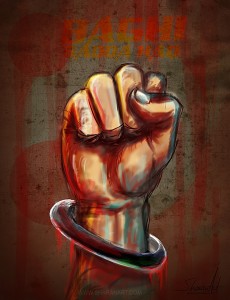 Today, the government of India has once again proved why it’s claim to being the world’s largest democracy is laughable. Not to mention the media in India, which claims to be fair and democratic in nature, however, this is simply not the case. India’s media is clearly state run and its news outlets make stories that create divides within communities. Why am I saying all this?
Today, the government of India has once again proved why it’s claim to being the world’s largest democracy is laughable. Not to mention the media in India, which claims to be fair and democratic in nature, however, this is simply not the case. India’s media is clearly state run and its news outlets make stories that create divides within communities. Why am I saying all this?
Sadda Haq is a fictional movie based on real events surrounding the militancy era in Punjab during the 1980s and 1990s. Showing accounts of “false encounters†and police brutality, the movie aims to show why average citizens were forced to take up arms against the oppressive regime. The movie was set to release worldwide today on April 5, 2013. Although the Indian Government can’t ban the movie worldwide, the Punjab government did manage to ban the movie in Punjab and other parts of India in just a few hours prior to its opening after the movie was privately screened to Punjab Police members and state government officials.
These officials who watched the private screening included the likes of DGP Sumedh Saini. Interestingly enough, the ban comes from the Punjab government run by Parkash Badal of the Akali Party, a party that is supposed to represent Sikh interests, but at the same time has promoted Saini to the ranks of DGP(Deputy General of Police) even after countless human rights claims exist against him for his participation in the post 1984 Punjab genocide of Sikh youth.
Over the past few days the Indian news outlets have been talking about Sadda Haq being a controversial film promoting Khalistan. It is no doubt that Sadda Haq discusses the militancy era, but its aim is to show the truth that has been pushed under the rug by the government and media.
Co-blogged with Nina Chanpreet Kaur
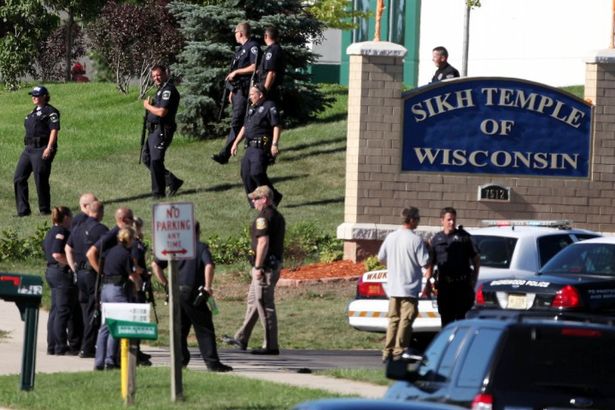
(source: Daily Record and Sunday Mail)
“All the talking is done and now it’s time to walk the walk / Revolution’s in the air 9mm in my hand / You can run but you can’t hide from this master plan.” (Song lyrics by Wade Michael Page’s band End Apathy)
A few weeks ago, the Federal Bureau of Investigation (FBI) closed its investigation into the mass shooting that occurred at the Sikh Temple of Wisconsin in August, in which six Sikhs were murdered and wounded four others, including Lieutenant Brian Murphy of the Oak Creek Police Department, and Punjab Singh, who is still in a long-term care facility receiving treatment.
The FBI’s conclusion does not bring any closure. In the wake of Oak Creek, the specter of a growing white supremacist movement has not been adequately addressed by the media, policy makers, nor law enforcement agencies. This frames the issue of hate crimes against Sikhs as something almost incidentally perpetrated by independent murderers, and the stalling by the FBI to accurately and consistently report anti-Sikh and other hate crimes as well as link it to domestic terrorism reinforces the sense that the white supremacy movement is something federal, state and local government are not taking seriously or prioritizing. Historically, the white supremacist movement at-large has perpetrated heinous crimes fueled by hate and bias often in the guise of a member gone rogue as we saw in Oak Creek in August 2012.
Guest Blogged by Nina Chanpreet Kaur
The year 2012 has been a series of heartbreaks. There is perhaps no greater pain than surviving a child. From Oak Creek, WI to the children whose lives were innocently lost in Newtown, CT and the millions of others who die as victims of violence every day, my heart breaks. So far, our response as a nation in the wake of Friday’s tragedy has been messy and presumptuous, but also clear and action-oriented at times. Deep pain, anguish, grief and conflict tend to have that affect: forcing us into action beyond our own daily lives and bringing us a greater sense of clarity.
In the wake of Sandy Hook, conversations about mental health, gun control laws and the root of violence in our schools, homes and communities continue to flash before our eyes. In response, we each do what we know best — for some it is grappling with a new world view to make space for such loss, for others it is taking time to grieve and release anxiety, and for several more it is taking quick action. So far, the Sandy Hook tragedy has transformed the views of some politicians and community members alike — Sikh Americans included. I am hopeful that this will bring increased attention and action to the problem of gun violence that also deeply affects the Sikh community.
The Sikh American community has responded to Sandy Hook by attending and organizing vigils across the country. A young Sikh boy imparted a beautiful message to the deceased children and national community, sharing his condolences. The Kalekas, who lost their father and members of their sangat to the tragedy in Oak Creek, have organized a movement around the film Nursery Crimes and met on Monday on the steps of City Hall in New York City along with Mayor Bloomberg and other politicians demanding gun control. They plan to travel with survivors from Oak Creek, Aurora and Columbine to Newtown, CT to lend a helping hand. Both Amardeep and Pardeep Kaleka have been instrumental in shining light on the roots of violence and hate and taking quick action. Producing several videos, erecting Serve 2 Unite and building a movement around Nursery Crimes are among a few of their many tremendous efforts. We need more Sikhs who are willing to speak up about the issue of gun control and systemic violence.
Co-blogged by Sundari and AmericanTurban
Last week, in the context of the significance of California’s 9th Congressional District to Sikh Americans, we sent the major candidates of California’s 9th Congressional District — incumbent Representative Jerry McNerney and challenger Ricky Gill — a questionnaire to learn more about their positions about Sikh American-related issues (see previous post here). Both candidates responded. However, the nature of the responses received were quite different.
Rep. Jerry McNerney’s campaign responded to the questionnaire and Ricky Gill’s campaign declined to answer. As we had stated in our earlier post, both responses will be printed verbatim and are below.
Co-blogged by Sundari and AmericanTurban
 Of recent and recurring discussion on The Langar Hall and American Turban has been the election race in California’s 9th Congressional District. For Sikh Americans, this district’s race is significant.Located in northern California, the 9th Congressional District contains America’s oldest and one of its largest Sikh American communities. The oldest Gurdwara in the United States (which only a couple of weeks ago celebrated its centennial anniversary) is located in this District in Stockton, California. America’s first Asian American and Sikh American member of Congress, Dalip Singh Saund, once resided in this area, and one of the candidates currently running is himself a Sikh American.Given the unique character of the District, we are interested to know the thoughts of the main candidates of the district on the issues affecting their current and potential Sikh American constituents, many of whom have been active in supporting each of the candidates. It is our plan to publish these answers by each candidate to learn more about their positions on issues affecting Sikh Americans.With election day in the US nearing, we have asked the main candidates — incumbent Representative Jerry McNerney and Republican challenger Ricky Gill — to offer their thoughts on Sikh American issues. We are aware that important concerns of the general public on issues like jobs, healthcare, or social issues are often already asked of the candidates, but that their positions on Sikh American issues are not asked of them. Accordingly, these questions reflect Sikh American concerns that do not get the same attention from mainstream media.
Of recent and recurring discussion on The Langar Hall and American Turban has been the election race in California’s 9th Congressional District. For Sikh Americans, this district’s race is significant.Located in northern California, the 9th Congressional District contains America’s oldest and one of its largest Sikh American communities. The oldest Gurdwara in the United States (which only a couple of weeks ago celebrated its centennial anniversary) is located in this District in Stockton, California. America’s first Asian American and Sikh American member of Congress, Dalip Singh Saund, once resided in this area, and one of the candidates currently running is himself a Sikh American.Given the unique character of the District, we are interested to know the thoughts of the main candidates of the district on the issues affecting their current and potential Sikh American constituents, many of whom have been active in supporting each of the candidates. It is our plan to publish these answers by each candidate to learn more about their positions on issues affecting Sikh Americans.With election day in the US nearing, we have asked the main candidates — incumbent Representative Jerry McNerney and Republican challenger Ricky Gill — to offer their thoughts on Sikh American issues. We are aware that important concerns of the general public on issues like jobs, healthcare, or social issues are often already asked of the candidates, but that their positions on Sikh American issues are not asked of them. Accordingly, these questions reflect Sikh American concerns that do not get the same attention from mainstream media.The questions that we have sent to the campaigns of Jerry McNerney and Ricky Gill are below the fold, and on Tuesday, October 30, we will publish the responses from each campaign.
This election year is a reminder that Sikh Americans need to participate more actively in civic and political life. In order for the government and the media to pay attention to issues affecting our community, we need to have a seat at the table where decisions are being made and ensure that our voice is included in any policy changes.
The following are two ways that individuals can take action to change law that would impact the lives of Sikh Americans in California. These actions are for individuals living in California, but similar actions can and will take place in other states at various times. California is the 8th largest economy in the world, so if these changes become law – then these actions are even more meaningful for the Sikh community. It will go down in history that Sikh Americans helped create change for not just our own community but other marginalized communities too.
The following two bills have already successfully passed through both the California Assembly and Senate. Much of the hard work has been accomplished thanks to advocates within the Sikh community, sangat members across the state and Sikh organizations such as The Sikh Coalition. The final step in this process is for Governor Brown to sign these bills into law. You can help by taking one small step for each bill – by simply contacting the Governor’s office. While Governor Brown has until September 30th to sign these bills into law, he can decide on the bills any day. We encourage you to take action today! Please leave a comment in the section below letting us know if you have taken action.
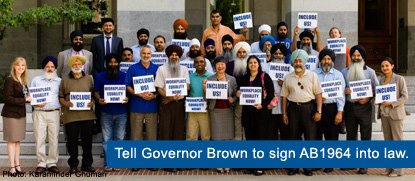 AB1964 – Workplace Religious Freedom Act: SIGN THE PETITION
AB1964 – Workplace Religious Freedom Act: SIGN THE PETITION
If this bill moves forward and becomes law, it will sharply reduce job discrimination against Sikhs and other religious minorities and guarantee equal employment opportunity to all workers in California.

SB1540 – Revised Curriculum Framework: History-Social Science: SIGN THE PETITION
This bill would authorize the State Board of Education to complete the revision process of the History-Social Science Framework for California schools. When completed, this framework will ensure that California students learn about Sikhism and Sikh contributions, thereby increasing appreciation for diversity and reducing ignorance of the sort that leads to bullying and bias.
On the morning September 11, 2001, long time train operator Sat Hari Singh (aka Kevin Harrington) was driving the 4 train towards lower  Manhattan when news of the attacks came in. He quickly directed the train in reverse, leading all his morning commuters to safety. The Metropolitan Transit Authority (MTA) later honored him as a hero of 9/11 for his efforts.
Manhattan when news of the attacks came in. He quickly directed the train in reverse, leading all his morning commuters to safety. The Metropolitan Transit Authority (MTA) later honored him as a hero of 9/11 for his efforts.
Soon thereafter, Singh and other Sikh transit workers as well as hijab-wearing Muslim transit workers were transferred to new jobs hidden from the public eye by the MTA, as long as they chose to wear their articles of faith, which apparently looked a little too “suspicious” in the aftermath of 9/11. After an uproar from the Sikh and Muslim communities as well as countless others concerned with civil rights and religious freedom, they were reinstated to their original jobs but with a caveat: their turbans and hijabs were to don the MTA logo.
“They called me a ‘hero of 9/11.’ I didn’t have a corporate logo on my turban on 9/11,” Sat Hari Singh said. “This policy made no sense. It was driven by fear.”
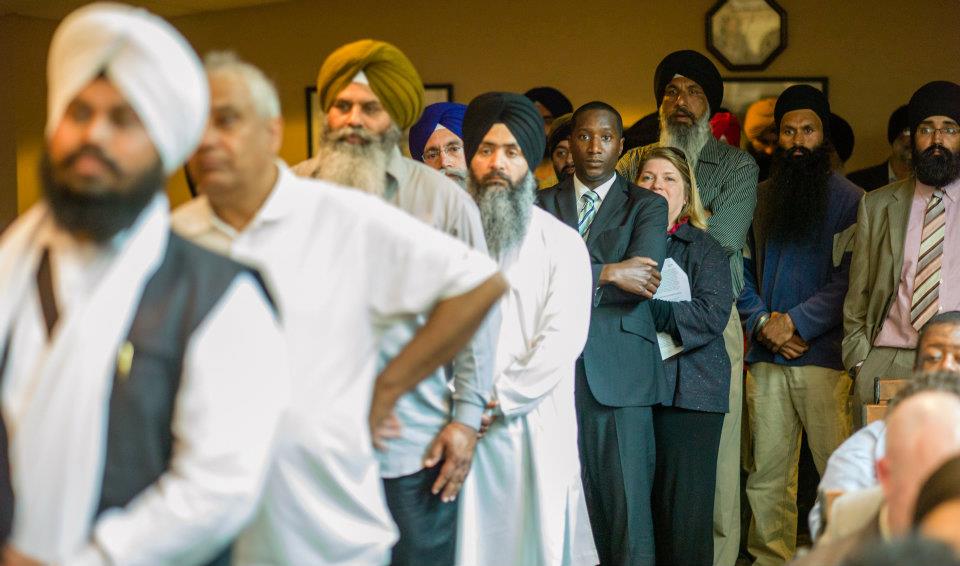
Credit: Karaminder Ghuman, Courtesy: The Sikh Coalition
The Sikh community is leading the way to strengthen law that will protect Sikhs and other religious minorities from job discrimination in the workplace. AB1964 – or the Workplace Religious Freedom Act (WRFA) – has been introduced by Assemblymember Mariko Yamada and is co-sponsored by The Sikh Coalition. Earlier this week, in a show of community leadership, the California Sikh sangat packed a hearing room in the California Assembly and testified in favor of AB1964. As a result, the bill passed through the Labor and Employment Committee and will be considered by the Judiciary Committee on Tuesday April 24th. The Sikh Coalition states that,
This is the first time in California’s history that the Workplace Religious Freedom Act has survived a committee vote, and this is a credit to the power of Sikhs to provide leadership on civil rights issues for all Americans. [link]
Why should Sikhs care about WRFA?
Sikhs suffer high levels of employment discrimination because of their Sikh identity. Many are told to shave their beards; others are told to remove their turbans; some are told that they can only work out of public view. If enacted, WRFA would make it harder in each of these cases for California employers to discriminate against Sikhs.
Over ten years after 9/11, the persistence of hate attacks targeting Sikhs in the US, whether in the form of bullying in  schools, vandalism of gurdwaras, or even cold blooded murder, is a sobering reality for our community. Jodha and I have both discussed elsewhere that the root cause of much of the anti-Sikh violence we see in the United States is the overwhelming vilification of Muslims and Islam in our country, and in the world, today. Nevertheless, it is imperative that we have sound data about anti-Sikh attacks specifically so we fully understand the scope of the problem and thus can address it effectively.
schools, vandalism of gurdwaras, or even cold blooded murder, is a sobering reality for our community. Jodha and I have both discussed elsewhere that the root cause of much of the anti-Sikh violence we see in the United States is the overwhelming vilification of Muslims and Islam in our country, and in the world, today. Nevertheless, it is imperative that we have sound data about anti-Sikh attacks specifically so we fully understand the scope of the problem and thus can address it effectively.
It may surprise you that the US government does not in any way keep track of hate crimes targeting Sikhs. Even in the midst of the surge in attacks against Sikhs in the wake of 9/11/01, the FBI never kept track of anti-Sikh crimes. While some of us may not see the FBI as the most trustworthy of agencies to protect our communities and our civil rights given its history of spying and repression, it is nevertheless outrageous that there isn’t even a “Sikh” box to be checked when a hate crime has been reported. It says a lot about the continued marginalization and relative invisibility of our community in the United States.
The legal banning of the burqa and niqab has once again been in the headlines this last week, b ut this time beyond Europe, in Canada (or as Tanmit from G.N.E. called it last week at Lahir, “America’s pagh”).
ut this time beyond Europe, in Canada (or as Tanmit from G.N.E. called it last week at Lahir, “America’s pagh”).
Minister of Citizenship, Immigration, and Multiculturalism Jason Kenney, known for his conservative and anti-immigrant policies, announced that new Canadian citizens will now be forced to remove the burqa or niqab while taking their oath of citizenship.
According to the Associated Press,
Jason Kenney said most Canadians have misgivings about Islamic face coverings and said new Canadians should take the oath in view of their fellow citizens…
The Conservative minister called the issue a matter of deep principle that goes to the heart of Canada’s identity and the country’s values of openness and equality. He said women who feel obliged to have their faces covered in public often come from a cultural milieu that treats women as property rather than equal human beings.
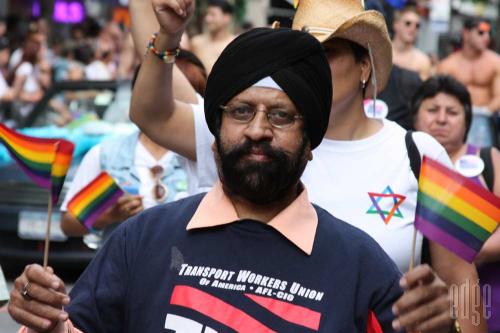
A friend sent me this photo yesterday from this past weekend’s annual LGBT Pride Parade in New York City, which was attended by about a million people. I’ve seen this Singh around NYC before. He happens to be one of the transit workers standing up to the NYC Transit Authority’s discriminatory “turban-branding” policy and now is also standing up for LGBT rights. Sikh solidarity seems to be in full swing lately.
The Pride festivities in NYC were a little different this year since they came just after state lawmakers voted in favor of legalizing gay marriage in New York last week. While some Sikhs (and Sikh institutions) have been outspoken about their opposition to allowing same-sex couples to marry, many others of us are celebrating this milestone civil rights victory in New York, seeing the fight for justice for LGBT people as no different as justice for women, people of color, or any other oppressed group.
Despite my previously alluded to reservations about the state sanctioning the way we structure our romantic relationships, households, and/or families, I believe that legalizing gay marriage is nevertheless a much needed blow to the deeply ingrained homophobia and heterosexism in our society. A lot more than marriage equality is needed to create the sort of radical transformation our Gurus envisioned for our world, but it is, at least today, a reason to say fateh!
A few years ago I was putting up some flyers on street poles and bulletin boards in Williamsburg, Brooklyn promoting an upcoming concert for my band. If you’re from New York City, you know Williamsburg is a neighborhood covered with concert flyers and band logos, and the home of dozens of music venues filled with indie rock-loving, skinny jeans-wearing hipsters (for the record, this has nothing to do with me nor my old band).
After a few minutes of putting up a bunch of flyers with tape, I was suddenly surrounded by 4 police cars and their flashing sirens. One of the cops approached me, while the others stayed close behind. He had one of our flyers in his hand and asked if I put it up. I said yes. He informed me this was “graffiti” and was illegal. I apologized and said I was not aware of that. He took my ID, talked to his colleagues, and the next thing I know I’m being aggressively handcuffed and put into the back of a police car without any explanation.
To make a long story short, I was arrested because a few years prior to the flyering incident, I got stopped and cited for riding my bicycle for a few feet on a sidewalk (in the rain) and never appeared in court for this egregious violation of the law and disturbance to the peace.
But this isn’t a story about why I got arrested and how ludicrous it is that these cops arrested me rather than asking me to please not put up flyers on street poles (which were already covered with flyers). This isn’t a story about racial or religious profiling and about if these (white) cops were driven by bias or if they were paying special attention to a turbaned, bearded brown man walking down a gentrified, newly predominantly white hipster block of Brooklyn.
This is a story about incarceration.
When I was taken to the precinct, still not knowing why I was arrested or what the hell was going on, I was aggressively and invasively patted down (more like groped) and searched by the officer who arrested me. After a few conversations with other officers at the precinct, I started putting the pieces together in my head as to why I was arrested, and they assured me that I’d be out of there in a few hours. I felt a bit relieved, though still anxious. I was hopeful that I could keep my head up and make it through this with my self-respect and dignity in tact.
Guest blogged by Preserve Architectural Heritage
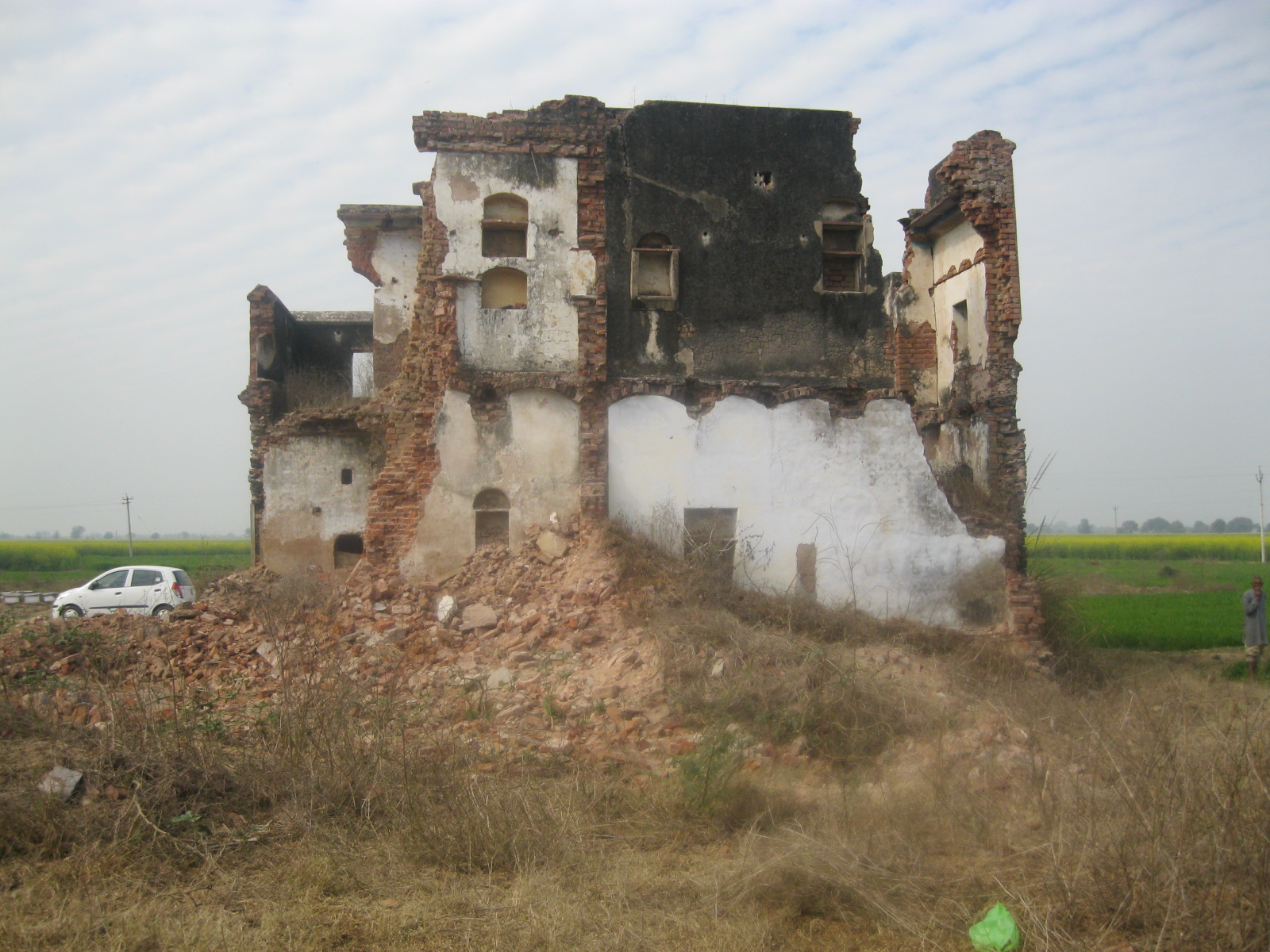 What: discovery of two sites linked to 1984: (1) Hondh Chillar, discovered January 2011. (2) Pataudi, discovered Februrary 2011. Both are in Haryana. Excerpts from Press Releases from Sikhs for Justice reveal that 32 men, women, and children were brutally tortured and killed in Hondh Chillar and 17 in Pataudi.
What: discovery of two sites linked to 1984: (1) Hondh Chillar, discovered January 2011. (2) Pataudi, discovered Februrary 2011. Both are in Haryana. Excerpts from Press Releases from Sikhs for Justice reveal that 32 men, women, and children were brutally tortured and killed in Hondh Chillar and 17 in Pataudi.
Why is this discovery important: So far all the investigation into the violence of 1984 has been done via interviews, eyewitness accounts, judicial commissions, and lawsuits. For the first time, we have living evidence of the genocide: the buildings speak for themselves. Though there are thousands of names on the ever-growing list of those killed in 1984, many of us have very little connection to those names since we don’t personally know the families. Even if some of us know or are related to survivors of the violence, it’s difficult and painful to have those individuals recollect and narrate their memories and experience.
Those of us with no familial connection to Operation Bluestar, those of us who were too young to remember, or were not born when this genocide tookplace now have a physical, tangible, alive, and direct relationship to this significant period of Sikh history through these sites. Since memory of any tragic event is intrinsically linked to physical location[s], it is absolutely crucial that we realize the value of Hondh Chillar and Pataudi as sites that provide us with a direct link to the memory of 1984. They are living sites, open for everyone to access and connect with. They are silent victims, that, just like the human victims of 1984, represent a crucial moment from the recent Sikh past.
Guest blogged by Brooklynwala
While many of us were celebrating 311 years of the Khalsa at Sikh Day Parades and Nagar Kirtans this weekend, thousands of immigrants and their allies gathered in Phoenix, Arizona on Sunday to protest what is being called the 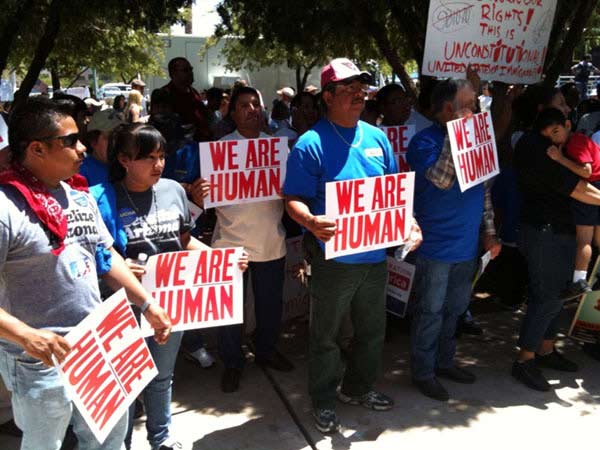 most anti-immigrant legislation in the United States, Senate Bill1070. Signed into law by Arizona Governor Jan Brewer on April 23rd, this measure allows local law enforcement authorities to question individuals based solely upon the suspicion that they may be undocumented.
most anti-immigrant legislation in the United States, Senate Bill1070. Signed into law by Arizona Governor Jan Brewer on April 23rd, this measure allows local law enforcement authorities to question individuals based solely upon the suspicion that they may be undocumented.
According to the New York Times, “The law…would make the failure to carry immigration documents a crime and give the police broad power to detain anyone suspected of being in the country illegally. Opponents have called it an open invitation for harassment and discrimination against Hispanics regardless of their citizenship status.”
President Obama stated that the law threatens “to undermine basic notions of fairness that we cherish as Americans, as well as the trust between police and our communities that is so crucial to keeping us safe.”
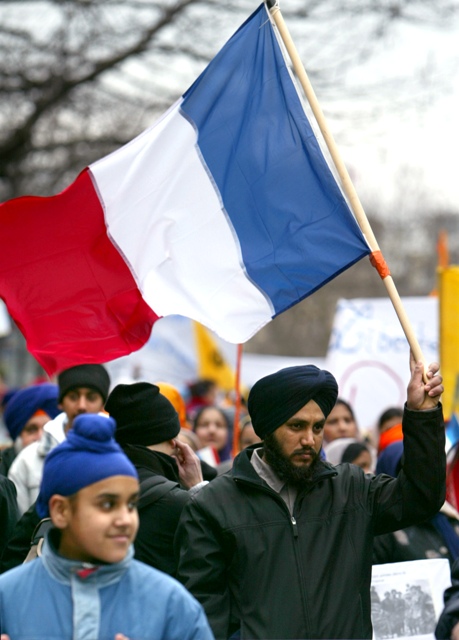 French legislators are currently considering a ban that would prevent Muslim women the right to wear full-body veils in public areas such as buses, trains, hospitals, restaurants, schools and other public places. Since 2004, head scarves and other signs of religious affiliation have been banned from public schools by a government determined to enforce France’s tradition of strict secularism amid fears of growing fundamentalism. Although Sikhs have also been fighting for their right to wear turbans in France – what will an overt ban, which sends a clear statement to its citizens about religious tolerance, mean to other minority groups in the country?
French legislators are currently considering a ban that would prevent Muslim women the right to wear full-body veils in public areas such as buses, trains, hospitals, restaurants, schools and other public places. Since 2004, head scarves and other signs of religious affiliation have been banned from public schools by a government determined to enforce France’s tradition of strict secularism amid fears of growing fundamentalism. Although Sikhs have also been fighting for their right to wear turbans in France – what will an overt ban, which sends a clear statement to its citizens about religious tolerance, mean to other minority groups in the country?
Identifying the burqa as alien to French culture, say the ban’s critics, also fans xenophobic sentiment. What will be declared un-French next? The sari? The Sikh turban? Day-Glo bicycle shorts? [link]
Interestingly – there are only about 2,000 Muslim women in France who wear these veils. Many say that France, a country that prides itself on liberal democracy, is simply taking away the individual freedom to make a choice. As an Op-Ed piece in the NYT asks, “Why the French obsession with the burqa? After all, as the French government itself has conceded, only about 1,900 women wear the full-body covering. So why are over half of the respondents in recent public opinion polls in favor of a ban on it?”
Almost two years ago I blogged about an NPR story that highlighted the issue of Runaway Grooms. Today, I once again write about the same issue – this time the media terms it “Holiday Brides” – a different name telling the same story. We should be outraged that years after we first heard about this issue, we are still having the same conversation. We are told that about 20,000 women have been deserted by men in the UK, US and Canada who promise to return to India and never do. The most recent questions is then, why are Punjabi women still falling for this obvious scam?
In a dusty village in the Jagraon district of Punjab, northern India, 35-year-old Suman (which is not her real name), lives with her widowed mother in a small room in a crumbling building. Four years ago, the secondary school teacher married a British man in a wedding arranged by relatives. Shortly after the ceremony, her husband, who is in his 50s, left for London with the promise he would send for her. At first all appeared to go well. “He would visit two to three times a year. “Whenever he came to India, we had a good time,” she said. However, on one visit he claimed her application for a spousal visa to the UK had been refused. It was like being a prostitute you take along and have a good time with and then leave behind ‘Suman’, 35 “He told me he had applied for an appeal. “But he has never shown me a copy of that appeal. He’s never shown me any documents.” The visits and calls ended, and for the past six months Suman has had no contact with her husband. “In hindsight, it was like being a prostitute you take along and have a good time with and then leave behind. [link]
Gurmeal Singh, the British Sikh police officer who was humiliated for practicing Sikhi, will be compensated for “indirect harassment” and humiliation. Judge Murray Creevy ruled that the Greater Manchester Police (GMP) viola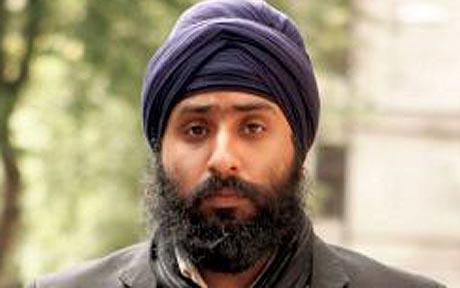 ted his dignity.
ted his dignity.
The BBC reports that the Assistant Chief Officer at GMP, Julia Rogers felt that they had always acted in the best interest of Singh. However, GMP accepts the ruling and has already updated their policies.
After a heated conversation with his Sergeant about his inability to remove his turban while on the job, Singh feared that he would be made to look like a comic character on television by wearing a modified turban.
Ultimately the ruling according to Singh’s lawyer:
“… leaves him in difficulty in relation to his future career but will hopefully open the eyes of Greater Manchester Police. He joined the police because of his values as a Sikh. What is important now is what Greater Manchester Police will do to help him come back.”
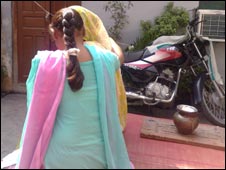 One of our goals on The Langar Hall is to raise awareness about issues affecting our community around the globe. Whether or not we identify or relate to these specific issues may not be as important as much as the acknowledgement that these issues do occur and that individuals and families and even children are affected. We hope that by raising awareness we can begin, as a community, to stand up against injustice in all its forms.
One of our goals on The Langar Hall is to raise awareness about issues affecting our community around the globe. Whether or not we identify or relate to these specific issues may not be as important as much as the acknowledgement that these issues do occur and that individuals and families and even children are affected. We hope that by raising awareness we can begin, as a community, to stand up against injustice in all its forms.
A recent article from the BBC reports that, according to campaigners in Punjab, British Asians are hiring contract killers to carry out up to 100 murders in India each year. One of the most well known cases is that of Surjit Athwal, a British Sikh woman who disappeared in Punjab in 1998. Eventually it was revealed that she had been murdered in a so-called honor killing after her in-laws discovered that she planned to divorce her husband. They had hired criminals in India to kill her. She was strangled and her body dumped in a river. Her brother, Jagdeesh Singh, now campaigns for other victims’ families.
“I think Surjit’s case exposed for the first time in this country overseas outsourced killings. How the Punjabi community, settled in Britain, send their females back to the land of origin, in the full knowledge that they can have them murdered easily, swiftly and efficiently.” [link]
